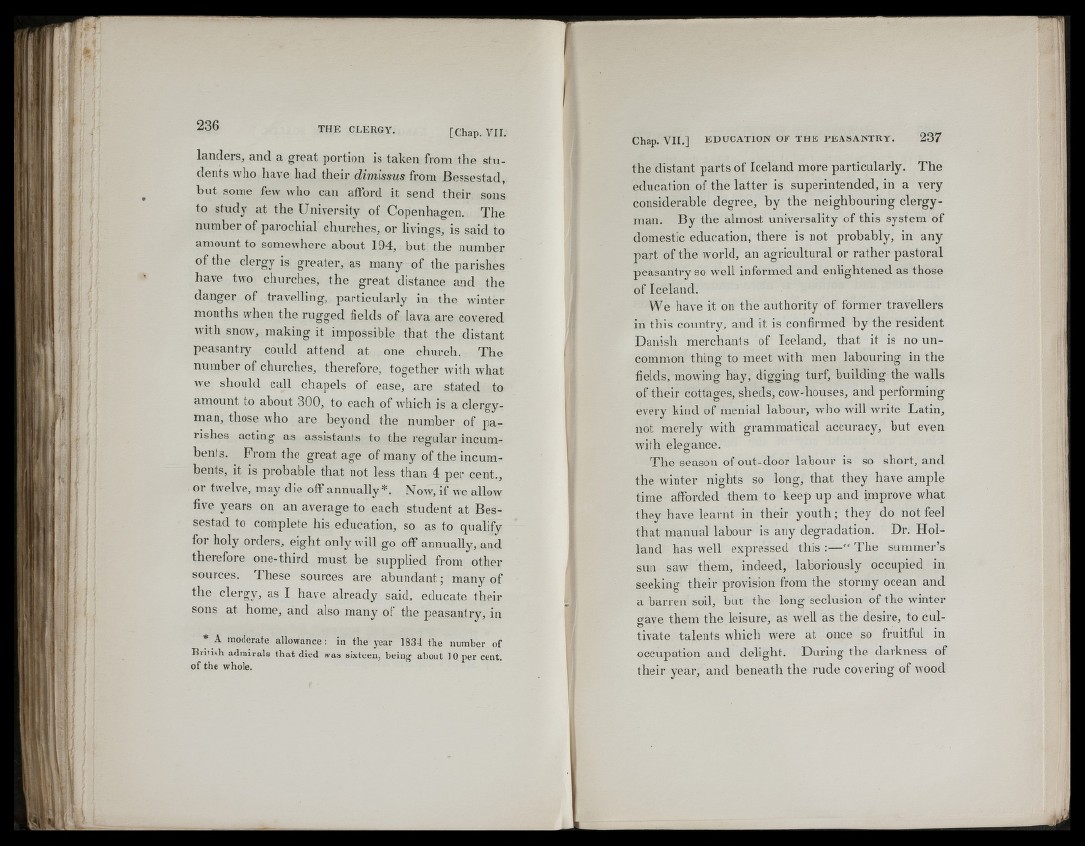
U!
f t
1«
3 1 1 .
u : i
U
landers, and a great portion is taken from the students
who have had their dimissus from Bessestad,
but some few who can afford it send their sons
to study at the University of Copenhagen. The
number of parochial churches, or livings, is said to
amount to somewhere about 194, but the number
of the clergy is greater, as many of the parishes
have two churches, the great distance and the
danger of travelling, particularly in the winter
months when the rugged fields of lava are covered
with snow, making it impossible that the distant
peasantry could attend at one church. The
number of churches, therefore, together with what
we should call chapels of ease, are stated to
amount to about 300, to each of which is a clergyman,
those who are beyond the number of p arishes
acting as assistants to the regular incumbents.
From the great age of many of the incumbents,
it is probable that not less than 4 per cent.,
or twelve, may die off annually*. Now, if we allow
five years on an average to each student at Bessestad
to complete his education, so as to qualify
for holy orders, eight only will go off annually, and
therefore one-third must be supplied from other
sources. These sources are abundant; many of
the clergy, as I have already said, educate their
sons at home, and also many of the peasantry, in
* A moderate allowance: in the year 1834 the number of
British admirals that died was sixteen, being about 10 per cent,
o f the whole.
the distant parts of Iceland more particularly. The
education of the latter is superintended, in a very
considerable degree, by the neighbouring clergyman.
By the almost universality of this system of
domestic education, there is not probably, in any
part of the world, an agricultural or rather pastoral
peasantry so well informed and enlightened as those
of Iceland.
We have it on the authority of former travellers
in this country, and it is confirmed by the resident
Danish merchants of Iceland, that it is no uncommon
thing to meet with men labouring in the
fields, mowing hay, digging turf, building the walls
of their cottages, sheds, cow-houses, and performing
every kind of menial labour, who will write Latin,
not merely with grammatical accuracy, but even
with elegance.
The season of out-door labour is so short, and
the winter nights so long, that they have ample
time afforded them to keep up and improve what
they have learnt in their youth; they do not feel
that manual labour is any degradation. Dr. Holland
has well expressed this :—“ The summer’s
sun saw them, indeed, laboriously occupied in
seeking their provision from the stormy ocean and
a barren soil, bur, the long seclusion of the winter
D-ave them the leisure, as well as the desire, to cul-
tivate talents which were at once so fruitful in
occupation and delight. During the darkness of
their year, and beneath the rude covering of wood